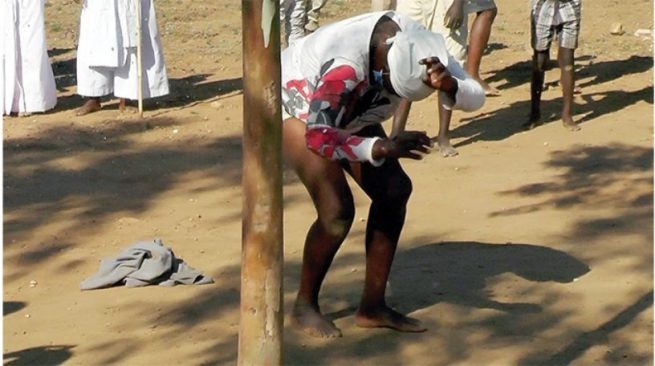By Sekai Moyo
Copyright myzimbabwe

A disturbing tale has emerged from Pumula South, Bulawayo, where a clandestine cult has been exploiting vulnerable women under the guise of religious practice. The cult, operating from a bushy shrine, lured desperate women with false promises of love, marriage, and faithful partners, using sex as a purported form of prayer.
The story first gained traction when a video showing women’s underwear hanging from bushes went viral approximately three weeks ago. The underwear, displayed in a grotesque manner, sparked outrage and curiosity across social media platforms.
In an investigation carried out by B-Metro, unsettling details were uncovered, revealing how self-proclaimed prophets were preying on vulnerable women. These so-called prophets convinced the women that their “healing” necessitated sexual acts with them.
One 39-year-old woman, speaking on condition of anonymity, admitted to undergoing the ritual last year, claiming it had been effective. “My dream was to get married young, like my mother who got married at 18. But I was always unlucky in love,” she explained. She revealed that a woman from her church had introduced her to the prophets, who were known for “fixing” women’s problems.
“At the shrine, the prophet prayed for me, then told me to strip naked,” she recounted. “He washed my panties in what he called holy water, then began touching me while praying.” The woman detailed how the prophet massaged her breasts and private parts, later claiming that her womb was the source of her problems. The ritual culminated in the prophet having sex with her, an act he described as necessary to resolve the issue.
“He told me to leave my panties behind, saying they contained evil spirits that would follow me home,” she said. “Two weeks later, my man paid lobola,” she insisted, crediting the prophet with saving her life. When confronted with the suggestion that she had been abused, she retorted angrily, “I knew what I was doing. He helped me and I don’t want you to destroy this lifeline for other women,” before abruptly leaving.
Another woman claimed that multiple male prophets operated at the site, even catering to prostitutes seeking to maintain their clients’ loyalty. “This place was always full. Even women from other cities came here,” she said.
However, the rituals have sparked outrage and disgust among many residents. Siphathiswe Nyathi, a Pumula South resident, stated, “These so-called prophets vanished when the video leaked.” Another man expressed his anger, questioning, “What kind of church is this? Our wives were naked before these men.”
Fidelis Tshuma highlighted that the cult was symptomatic of a broader issue of illegal churches proliferating in the area. “We have over 16 churches in the bush. I once saw a man with 30 women. The ground was littered with over 50 pairs of wet panties,” Tshuma said. “The sad thing is, women are letting strange men touch them in the name of prayer. This is not right.” He urged the Environmental Management Agency and Bulawayo City Council to clear the area, jokingly asking, “Who will collect all those dirty panties?”
Village head, Vidco Maseko, condemned the practice, stating, “When we grew up, we never saw this style of worship. Government must intervene, but carefully, so as not to violate freedom of worship.”
Ward 17 Councillor Skhululekile Moyo, who visited the site, expressed concern that the rituals were polluting the forest and “causing drought”. “The elders who prepare for the Njelele festival need to cleanse this place. We need help from the authorities,” she said.
Nkethabatshabe Amasiko, a traditional group, is planning a cleansing ceremony. Lameck Joseph Moyo, the group’s leader, explained, “These women’s underwear and shiny bottles are blocking the rain. In our culture, you must cover shiny objects before rain falls. Imagine buying your wife underwear only for her to go and remove it for another man in the bush?”
The presence of over sixteen churches operating in the bush has raised concerns about the regulation and monitoring of religious activities in the area. Residents are calling for stricter enforcement of regulations to prevent the exploitation of vulnerable individuals under the guise of religious practice.
The call for government intervention highlights the delicate balance between protecting freedom of worship and safeguarding citizens from harmful practices. Authorities face the challenge of addressing the issue without infringing on constitutional rights.
The planned cleansing ceremony by Nkethabatshabe Amasiko underscores the cultural and spiritual significance of the affected area. Traditional leaders and community members believe that the rituals have disrupted the natural order and are seeking to restore harmony through cleansing practices.
The incident has sparked a wider debate about the role of religion in society and the potential for abuse of power within religious institutions. Questions are being raised about the accountability of religious leaders and the need for greater transparency and oversight in religious organisations.
As the investigation unfolds, the community grapples with the aftermath of the scandal, seeking answers and solutions to prevent similar incidents from occurring in the future.